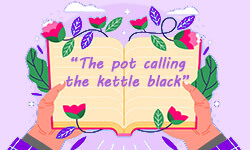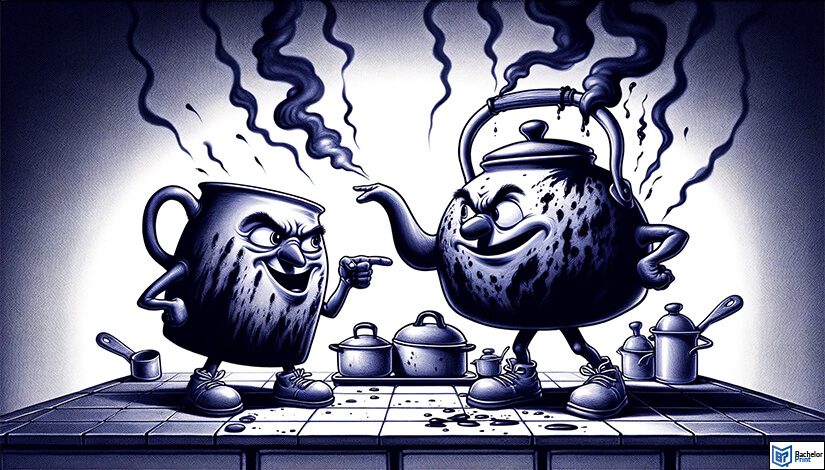
“The pot calling the kettle black” is a widely known proverb in the English language, originating from Spanish. The meaning of this saying depicts a timeless illustration of human hypocrisy and double standards that is still relevant today. Understanding proverbs requires cultural and traditional comprehension. This skill is not only a linguistic relic, but also imperative to have a broader insight into the world.
Definition: “The pot calling the kettle black”
The core meaning of this proverbial saying refers to someone calling out a flaw or fault of someone else that they possess themselves. It is rooted in the hypocrisy and irony of the accusation or criticism, as this reflects a characteristic of the accuser themself.
The following examples will illustrate the hypocrisy and irony underlying the proverb and describe exemplary situations clarifying the meaning of the proverb “the pot calling the kettle black:”
The examples display multiple situations showcasing the meaning of the proverb “the pot calling the kettle black” by portraying hypocritical or ironic actions and situations.
It should be noted that this proverb expresses an informal fallacy, known as Tu quoque, a type of ad hominem fallacy, or appeal to hypocrisy. It is a error in logic, where a person is guilty of the accusations they make toward another person. Thus, the actions of the accuser do not support the logic of the argument in any way.
Explanation of the visual meaning
In the past, pots and kettles were used over open flames, which eventually blackened them. The proverb “the pot calling the kettle black” illustrates metaphorically that a pot that is blackened from the open fire accuses the kettle of being black from the open fire, although it is black itself. Transferring this proverb in real-life situations would point out the hypocritical behavior of the accuser, as it is illogical or unreasonable to criticize someone else for an issue that they exhibit themselves.
Another interpretation of this proverb would be that while the pot is sooty from the cooking fire, the kettle is shiny and polished and the pot’s accusation of the kettle being blackened derives from its own reflection. In this interpretation, the pot accuses the kettle of a flaw that it doesn’t have but itself does, referring to a finger-pointing scenario.

How to use it
This proverbial phrase is used in contexts or situations, which involve calling out hypocrisy or criticizing someone for a flaw that they have themselves. It is most effective in scenarios where the hypocrisy is evident and obvious. Typically, it is used in a humorous way to avoid a tone that may seem confrontational or accusatory. The following accounts for various modern contexts, where the proverb may be used.
This phrase may be used when defending oneself in personal dialogue. In other words, when someone accuses you of something they characterize or have done themselves.
This proverb may be used in public discourse, calling out a public or influential figure.
When analyzing literacy or academic text, this proverbial phrase may be used to make a point.
Calling out social groups hypocritically criticizing social issues when they are not affected by them in any way or even contributing to them.
Origin and history
Tracing back many centuries, the saying “the pot calling the kettle black” has an interesting and rich history. It entails and originates from kitchenware that was commonly used over open fire in the past. The imagery represents a pot that is blackened from the flame calling the kettle black, although it is blackened itself, illustrating hypocritical behavior.
The exact origin of this proverb is unknown, however, its earliest record in the English language can be found in the translated version of the Spanish novel “Don Quixote” by Thomas Shelton in 1620. The Spanish passage states, “Dijo el sartén a la caldera, Quítate allá ojinegra,” which directly translates to “Said the pan to the pot, get out of there black-eyes.” John Clarke’s compilation of proverbs “Paroemiologia Anglo-Latina” from 1639 contains a different version, translating to “The pot calling the pan burnt-arse.” In 1682, William Penn’s collection “Some Fruits of Solitude in Reflections and Maxims” contains the contemporary wording of the proverb as stated in the following:
“For a Covetous Man to inveigh against Prodigality, an Atheist against Idolatry, a Tyrant against Rebellion, or a Lyer against Forgery, and a Drunkard against Intemperance, is for the Pot to call the Kettle black.”
Similar proverbs and synonyms
There is a list of similar proverbs and synonyms that focus on the themes of self-awareness and hypocrisy. The following list shows some of the widely known ones:
- People who live in glass houses shouldn’t throw stones.
- The blind leading the blind.
- A thief berating a thief.
- Two of a kind.
- To cut off one’s nose to spite one’s face.
- Sweep before your own door.
- Don’t judge a book by its cover.
- Double standards
- Hypocritical
- Two-faced
- Appeal to hypocrisy
FAQs
This proverbs refers to a situation where someone accuses another of a flaw or fault, which the accusers has himself. It calls out hypocrisy and psychological projection.
This saying depicts irony, as it reflects hypocritical criticism, meaning a certain opposition and contradiction of a statement.
Similar words and synonyms for the proverb “the pot calling the kettle black” are mentioned in the following:
- Hypocritical
- Double standards
- Two-faced
Find similar proverbs in the list in this article.
- ✓ 3D live preview of your individual configuration
- ✓ Free express delivery for every single purchase
- ✓ Top-notch bindings with customised embossing

